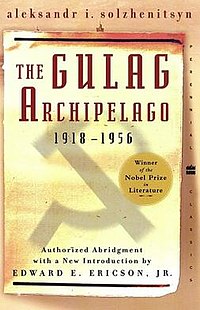 | |
| Author | Aleksandr Solzhenitsyn |
|---|---|
| Original title | Архипелаг ГУЛАГ |
| Translator |
|
| Language | Russian |
| Publisher | YMCA Press |
Publication date | 1973 |
| Publication place | France |
Published in English | 1974 |
| Media type | Print (hardback and paperback) |
| ISBN | 0-06-013914-5 |
| OCLC | 802879 |
| 365/.45/0947 | |
| LC Class | HV9713 .S6413 1974 |
| This article is part of a series on |
| Conservatism in Russia |
|---|
 |
The Gulag Archipelago: An Experiment in Literary Investigation (Russian: Архипелаг ГУЛАГ, romanized: Arkhipelag GULAG) is a three-volume series written between 1958 and 1968 by Russian writer Aleksandr Solzhenitsyn, a Soviet dissident. It was first published in 1973 by the Parisian publisher YMCA-Press,[1][2] and it was translated into English and French the following year. It explores a vision of life in what is often known as the Gulag, the Soviet labour camp system. Solzhenitsyn constructed his highly detailed narrative from various sources including reports, interviews, statements, diaries, legal documents, and his own experience as a Gulag prisoner.
Following its publication, the book was initially circulated in the Soviet Union by samizdat underground publication. It was not widely published there until 1989. It appeared that year in the literary journal Novy Mir; a third of the work was published in three issues.[3] Since the dissolution of the Soviet Union, The Gulag Archipelago has been officially published in Russia.
- ^ "Goulag dans " Le Monde ", l'avant et l'après Soljenitsyne". Le Monde.fr (in French). 28 December 2023. Retrieved 2 January 2024.
- ^ "Cinquante ans après avoir édité "L'Archipel du Goulag", la librairie Les Éditeurs réunis à Paris résiste encore". www.telerama.fr (in French). 20 December 2023. Retrieved 2 January 2024.
- ^ Joseph Pearce (2011). Solzhenitsyn: A Soul in Exile. Ignatius Press. pp. 81–. ISBN 978-1-58617-496-5.